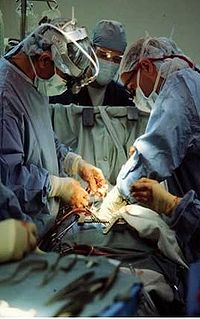
Photo from wikipedia
OBJECTIVE The effect of dexmedetomidine on postoperative renal function was investigated in patients undergoing cardiac valve surgery under cardiopulmonary bypass (CPB). DESIGN A randomized controlled trial. SETTING University teaching, grade… Click to show full abstract
OBJECTIVE The effect of dexmedetomidine on postoperative renal function was investigated in patients undergoing cardiac valve surgery under cardiopulmonary bypass (CPB). DESIGN A randomized controlled trial. SETTING University teaching, grade A tertiary hospital. PARTICIPANTS A total of 70 patients scheduled to undergo cardiac valve replacement or valvuloplasty under CPB were eligible and randomly divided into groups D (n = 35) and C (n = 35) between January 2020 and March 2021. INTERVENTIONS Patients in group D were administered 0.6 μg/kg/h of dexmedetomidine intravenously from 10 minutes before anesthesia induction to 6 hours after surgery; normal saline was used instead of dexmedetomidine in group C. MEASUREMENTS AND MAIN RESULTS The primary outcome was the incidence of acute kidney injury (AKI). Acute kidney injury was defined according to the Kidney Disease Improving Global Outcomes (2012). It was 22.86% and 48.57% in groups D and C, respectively (p = 0.025). The secondary outcomes were intraoperative hemodynamics and various indices in serum. Ten minutes before CPB (T1), 10 minutes after CPB (T2), and 30 minutes after CPB (T3), mean arterial pressure in group D was lower than that in group C, with statistical significance (74.94 ± 8.52 v 81.89 ± 13.66 mmHg, p=0.013; 62.83 ± 11.27 v 71.86 ± 7.89 mmHg, p < 0.001; 72.26 ± 8.75 v 78.57 ± 8.83 mmHg, p = 0.004). At T1, the heart rate in group D was significantly lower than in group C (80.89 ± 14.04 v 95.54 ± 12.53 bpm, p=0.022). The tumor necrosis factor α, interleukin-6, C-reactive protein, and cystatin C levels in group D were lower than those in group C after the surgery (T4) and 24 hours after surgery (T5), with statistical significance. The duration of mechanical ventilation, intensive-care-unit stay time, and hospital stay time in group D were significantly shorter than in group C. The incidences of tachycardia, hypertension, nausea, and vomiting in group D were similar to those in group C. CONCLUSIONS Dexmedetomidine may be considered as a way to reduce the incidence and severity of postoperative AKI in patients undergoing cardiac valve surgery under cardiopulmonary bypass.
Journal Title: Journal of cardiothoracic and vascular anesthesia
Year Published: 2023
Link to full text (if available)
Share on Social Media: Sign Up to like & get
recommendations!